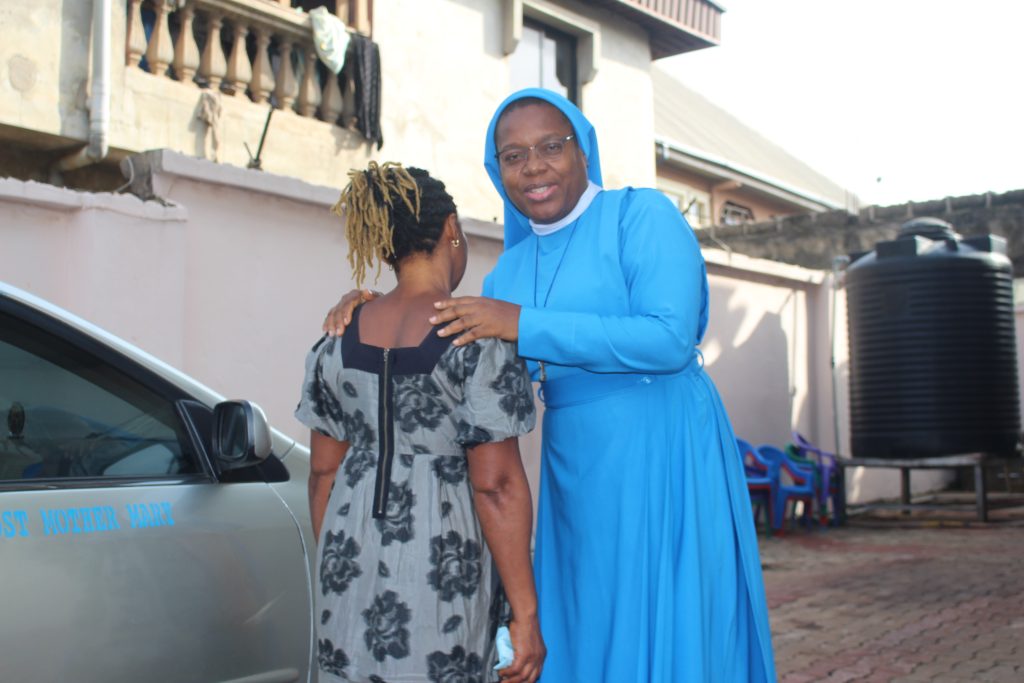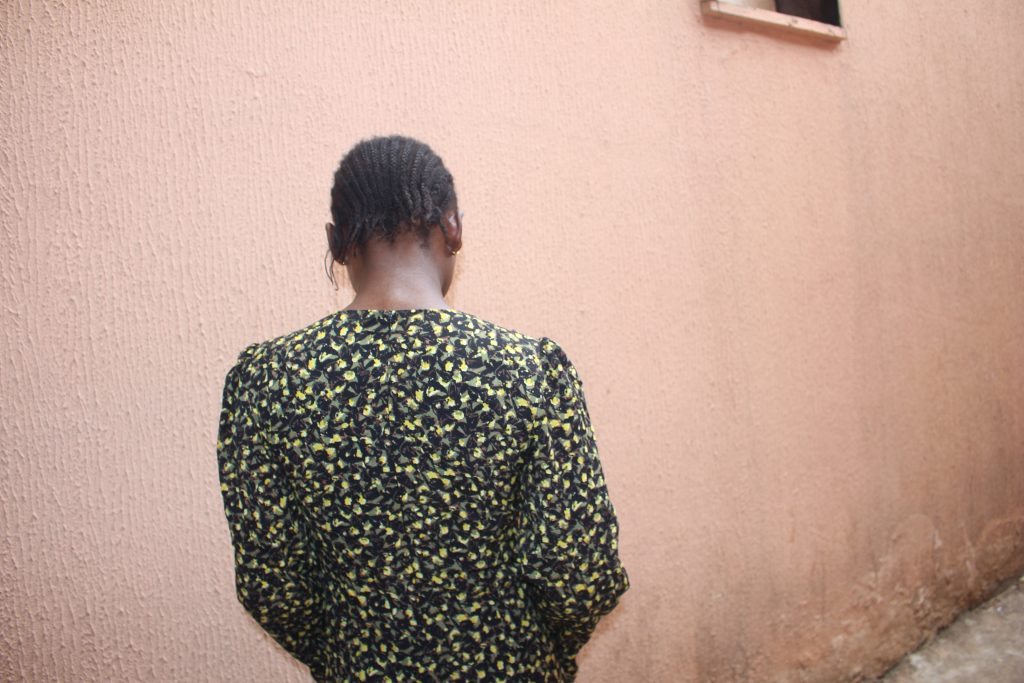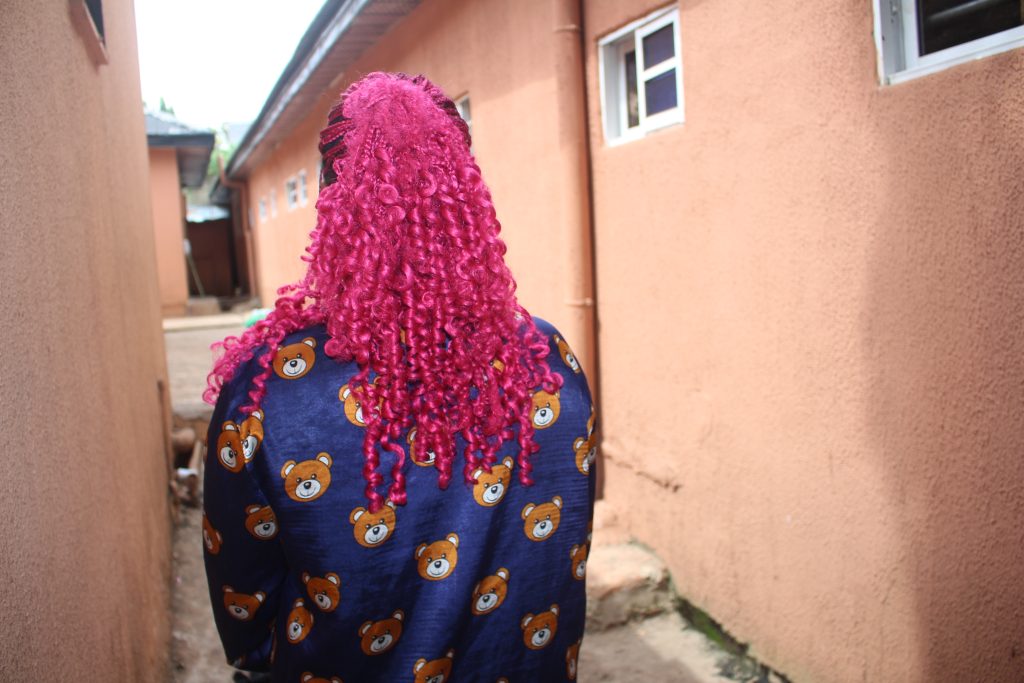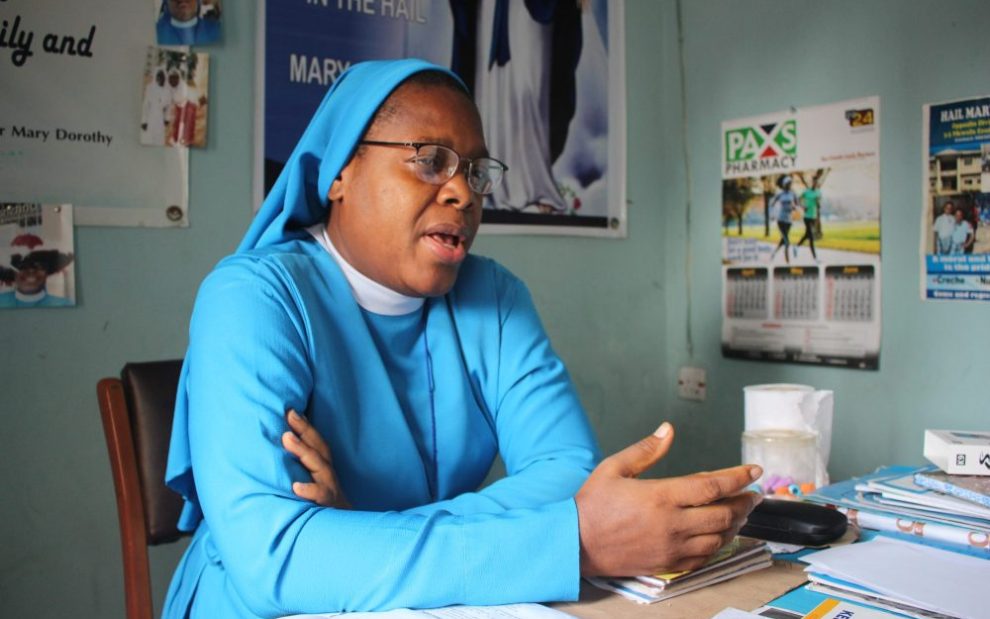In 2022, Deborah Daniel was working as a salesgirl in a bookshop when her friend tricked her into prostitution in Onitsha, a city located on the eastern bank of the Niger River in Nigeria’s Anambra State. At the time, Daniel was just 23.
She had confided to her friend her urgent need for $1,250 to rent a shop and establish a small clothing business. This would provide her with the means to support herself through her Higher National Diploma program, equivalent to the second year of a bachelor’s degree. Daniel had just completed her National Diploma program at the Ken Saro-Wiwa Polytechnic, graduating with top honors in Science Laboratory Technology.
“My friend advised me to quit my salesgirl job because she has a better offer,” Daniel says, “one which could earn me a lot of money in three months, if I agreed to join her where she works. She said it was ‘quick money,’ that I’ll just come in, get my money, and then leave.”
But two years into selling sex, Daniel had barely earned half the money she needed. She was left with shattered dreams, feeling utterly broken.
Sr. Dorothy Okoli, founder of the Missionary Sisters of St John Paul II of Mary, says Daniel is just one of many young Nigerian women trapped in prostitution. The nation has many young women living in brothels and engaging in prostitution, but an absence of data makes it difficult to precisely quantify the influx of Nigerian young women entering the sex trade.
Okoli is championing a rehabilitation program for these women who slip into the seedy world of prostitution. “They are often lured with vague promises,” she says, “which most times push them into a situation where they find themselves between a rock and a hard place, and the tough choice they have to make. But it becomes too late when they realize what’s happening.”

Okoli started this work in September 2021, and since then, she has devoted her life to visiting brothels, providing rehabilitation, counseling, and psychosocial support to girls and women through her initiative, Save Young Girls Motherhood Foundation.
She works with nine other sisters in her congregation and seven volunteer medical personnel. “I can say that we know the problems these people are undergoing,” she says, “at least because we are women, and most of them choose to meet us, believing that they would get adequate help from us.”
On a typical day, Okoli drives her silver Toyota Corolla to a hotel or brothel where young women engage in transactional sex. The car bears the sign “Most Mother Mary,” and in its trunk, it carries gifts for the women.
Upon arrival, after getting authorization from the manager, Okoli proceeds to the women’s lodge. “I purposefully visit them with gifts, to let them feel loved and needed by the society,” she says, “and they often welcome me with open arms. They sometimes call me over the phone after our engagement to ask when next I’d be coming to visit them.”
The medical personnel in her team carry out tests for hepatitis B and C—the two most deadly variants of the disease—as well as HIV and AIDS. They also test for malaria, typhoid fever, and sexually transmitted infections (STIs). The test results are sent to the women’s phones. Women with positive tests are advised to visit nearby hospitals for immediate treatment.
Okoli attributes the influx of young women into prostitution to many factors: difficulty in finding legitimate jobs, household violence, debts, low income, lack of skills, or lack of education. “Many of these young women finding jobs in prostitution are from dysfunctional homes,” she says. “Some of them are from poor family backgrounds which makes them vulnerable and creates an enabling environment for these dehumanizing activities to thrive.”
Okoli says most young girls pulled into prostitution come from rural villages. “They are mostly underage girls, and these are people who lack care and assistance from their families, government and the society.”
Nigeria’s constitution does not specifically criminalize transactional sex, only benefiting from its proceeds. However, Amaka Enemo, the national coordinator of Nigeria Sex Workers Association, a network that covers all sex worker organizations in Nigeria, says law enforcement agencies constantly target these women. “Sex workers have been facing severe human rights abuses and multiple forms of discrimination in Nigeria,” Enemo says. “Sex workers are harassed and punished by law enforcement agencies. . . In Northern states, the policing of sex work is so punitive in some cases that it calls for stoning of a woman caught doing sex work.”

Nigeria has a diverse legal system that varies between regions. Critics say that the Islamic law that prevails in northern Nigeria, also known as Sharia law, is “draconian” and a violation of Nigeria’s constitution. Nevertheless, Sharia law has been implemented in 12 of Nigeria’s 36 states. In these states, special Sharia courts handle criminal cases, including those having to do with prostitution.
Dr. Esohe Aghatise, the executive director of Iroko Onlus and one of the leading activists campaigning to eliminate global prostitution and sex trafficking, says, “Trafficking is not a phenomenon that affects just one or a few countries. It affects all countries in the world. It is on this global basis that efforts must be made to address the issue.”
Aghatise calls for strategies that would prevent trafficking, which, she says, “include education and training programs, especially for female children, as well as investment in agricultural and basic-needs industries.” Her organization provides emergency short-term housing for immigrant women and children, with special attention given to victims of trafficking. “Women are housed until they are back on their feet and financially stable,” she says. “We also provide financial assistance to those who wish to return home.”
Aghatise insists that prostitution, sometimes called the “oldest profession in the world,” should not be tolerated as a “normal” form of social exchange between men and women. Doing so, she says, denies “the inherent violence and oppression contained in such exchange.” Meanwhile, Sr. Dorothy sees prostitution as not only sexual exploitation but also as an abuse of the body of Christ. “Biblically, our body is the temple of the Holy Spirit,” she says.
In 2019, Nigerian filmmaker Kenneth Gyang produced the movie Òlòtūré, a haunting story that beamed a spotlight on Nigeria’s sex trafficking and prostitution crisis. Gyang explains what inspired him to make the film: “I travel a lot, especially in Europe, and I see Nigerian sisters, West African sisters, in dark corners of countries like Luxembourg.” His film sparked a global conversation on the sexual exploitation and ruthless violence that women experience.
In 2022, Nigeria’s then–vice president, Professor Yemi Osinbajo, described human trafficking as a “challenge of extraordinary magnitude.” He went on to say: “Empirical evidence shows that it is a multi-billion dollars enterprise, with criminals exploiting their victims over and over.”
Deborah Daniel says that disengaging from prostitution requires therapy and rehabilitation. “Nobody will venture into this work and not have regrets. Some will silently have it, and some will speak up about it. But then, all the person needs is therapy to heal. You need somebody to talk to before leaving, because there are people that might leave but would end up finding themselves back here.”
She goes on to say: “We need rehabilitation to help us get on that journey of redemption. This is a job that exposes us to all sorts of dangers, including things like drug addiction, and before you get to be free from drugs, you need to go for rehabilitation.”
Daniel feels sad, she says, that “I sold my pride because I needed quick money. As a woman, you sleeping with men for money is like selling your pride and dignity, that alone is traumatizing. The assault and discrimination that comes with it is unbearable.”
Okoli is working to provide intervention for Daniel and many other girls whom she describes as “a new batch.” Scant resources, however, make her work difficult.

“Deborah Daniel and many other girls I recently discovered need rehabilitation, therapy, and financial assistance to rebuild their lives. But as you can see, we don’t have a rehabilitation center where the transformed girls could be kept to learn vocational training, after which they would be empowered to help them become financially independent and keep their minds away from the odd job.” Nevertheless, Okoli has so far provided intervention for 20 girls who have relocated to their villages to restart their lives.
Okoli’s efforts also extend to women abandoned by their husbands, giving them psychosocial support such as counseling, money, food items, and necessities to take care of themselves and their children. She says the abandonment often leaves these women in a state of loneliness and poverty that could make them vulnerable to prostitution.
This work is also challenged by a lack of funding, which slows down the pace of her interventions. “Many of the girls and women need shelter, they need roof over their head,” she says. “But we don’t have accommodation that could serve as both accommodation and skill acquisition center for them.”
Esohe Aghatise says that if Okoli’s work could be replicated in many other Nigerian communities, it would “have a ripple effect.” Coupled with awareness-raising and grassroots action, these efforts could change many women’s lives. Aghatse also calls for “education of youth groups, who can then become a kind of peer educator, going from village to village to educate families [and] young people.”
“Each time I visit them in the brothel, they request to go home with me,” Okoli says, “but I am financially constrained. I don’t have where to accommodate them. So, I need all the support that I can get to help them rebuild their lives.”
Header Image: Sister Dorothy Okoli, founder of theMissionary Sisters of St. John Paul II of Mary, is championing a rehabilitation program for young Nigerian girls and women who slip into the seedy world of prostitution in Onitsha, Nigeria. U.S. Catholic Photo/ Valentine Benjamin














Add comment